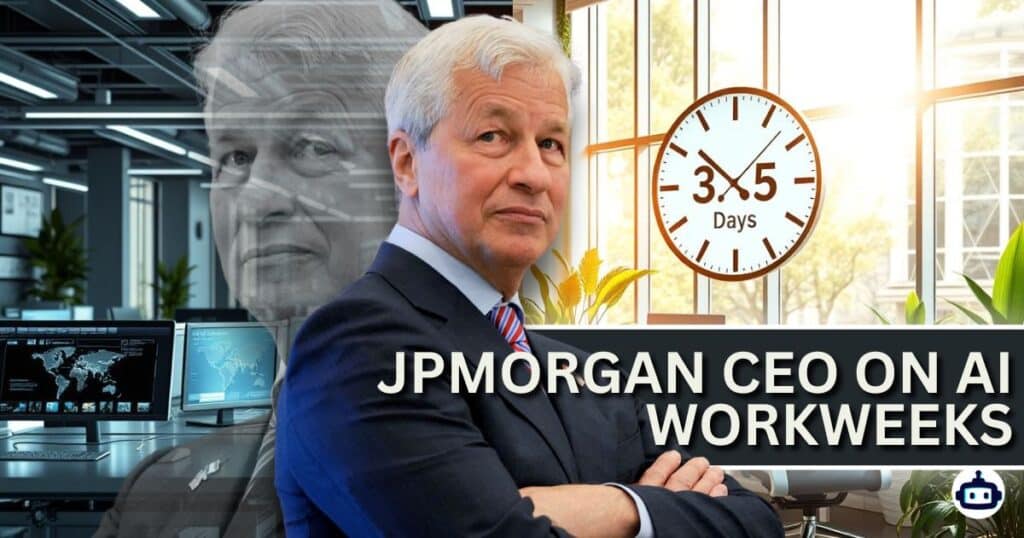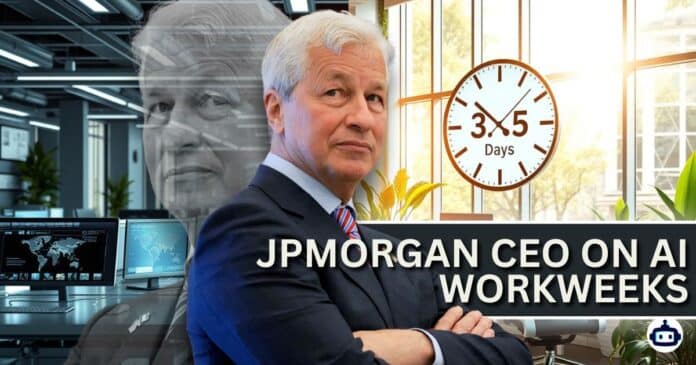
Get ready for a big change in how we work, thanks to JPMorgan’s CEO, Jamie Dimon. He’s announced that artificial intelligence (AI) will soon make our 5-day workweek a thing of the past. Instead, we’ll be working just 3.5 days a week.
Dimon’s idea is a game-changer, and it’s making waves everywhere. His words carry a lot of weight, especially in the financial world. This news could change how we see work and productivity forever.
So, what does this mean for you? Think about having an extra day and a half off. You could enjoy more personal time without losing out on your career or money. It’s a dream come true that could make our lives better in many ways.
Key Takeaways
- JPMorgan CEO Jamie Dimon predicts a 3.5-day workweek due to the power of AI
- This revolutionary announcement is shaking up the corporate world
- The potential to transform work-life balance and enhance productivity
- Implications for the future of work and the role of AI in the workplace
- Excitement and speculation around Dimon’s bold vision for the future
The Revolutionary Announcement That’s Shaking Up Corporate America
JPMorgan CEO Jamie Dimon has made a big move. He wants to change the 5-day workweek to just 3.5 days. This plan uses new technology to make work more efficient.
Jamie Dimon’s Bold Vision for the Future
Dimon’s idea has sparked a lot of talk. He thinks using artificial intelligence (AI) can make work shorter without losing quality. He believes this will make employees happier and more productive.
Key Points from the JPMorgan Statement
Dimon talked about how this change will help. He said AI will make tasks easier and let employees do more important work. He also thinks it will improve work-life balance and mental health.
Initial Market Reactions
The market is divided on Dimon’s idea. Some see the benefits of a shorter workweek, while others are unsure. The debate will continue as everyone tries to understand the impact of this change.
JPMorgan CEO on AI Workweeks: Breaking Down the Prediction
JPMorgan Chase CEO Jamie Dimon has made a big statement. He thinks AI could change the 5-day workweek into just 3.5 days. This idea is making waves in the business world.
Dimon believes AI and automation will make work more efficient. AI can do repetitive tasks, freeing up time for more important work. This could mean employees can do more in less time.
| Key Factors | Impact on Workweek |
|---|---|
| AI-Driven Automation | Reduction in time spent on mundane, repetitive tasks |
| Machine Learning-Powered Productivity | Enhanced decision-making and problem-solving capabilities |
| Intelligent Workflow Management | Optimized resource allocation and task prioritization |
A 3.5-day workweek could change a lot. It could make people happier, reduce stress, and give more time for personal and family activities. This could also boost the economy.
But, making this happen won’t be easy. There are many challenges to overcome. Still, the idea of a better work-life balance with AI is very appealing.

How AI Technology Will Enable Shorter Working Hours
AI technology is changing how we work. It automates tasks, boosts productivity, and manages workflows. This could lead to a more efficient and employee-friendly work environment.
Automation of Repetitive Tasks
AI automates boring, repetitive tasks. This frees up employees for high-value, creative tasks. It makes work more productive and reduces the time needed to do tasks.
Enhanced Productivity Through Machine Learning
AI uses machine learning to analyze data and optimize workflows. It streamlines processes, making work smarter, not harder. AI helps teams achieve more in less time.
Smart Workflow Management Systems
AI in workflow management systems changes work. It prioritizes tasks, schedules, and collaborates. This reduces administrative work, making a 3.5-day workweek possible.
AI is making shorter work hours and better work-life balance possible. It boosts employee productivity and transforms the workforce. This leads to a future that values both success and well-being.
The Economic Impact of a 3.5-Day Workweek
Switching to a 3.5-day workweek, as JPMorgan CEO Jamie Dimon suggests, could change the economy a lot. The idea of working less with AI’s help is exciting. But, we must think about the economic effects of such a change.
One big plus of a 3.5-day workweek is better employee productivity. AI can do routine tasks and make work flow better. This means workers can do more in less time. Businesses might save money by needing fewer people to get the same job done.
| Metric | Current 5-Day Workweek | Proposed 3.5-Day Workweek |
|---|---|---|
| Average Weekly Hours | 40 hours | 28 hours |
| Estimated Productivity Increase | – | 15-20% |
| Potential Cost Savings | – | Up to 12% of labor costs |
The effects of a shorter workweek go beyond saving money. It could also make employees happier and healthier. This could mean fewer sick days, lower healthcare costs, and more money spent by consumers. All these could help the economy grow.
While moving to a 3.5-day workweek might face some hurdles, the benefits of AI-driven productivity and health are clear. As we move forward, it’s key to weigh the pros and cons. This will help ensure the economy thrives in the long run.
Employee Well-being and Work-Life Balance in the AI Era
The workforce is changing with the help of artificial intelligence (AI). We’re seeing a big shift in how we care for employees and balance work and life. A move to a 3.5-day workweek, as JPMorgan’s CEO predicts, could make the workforce healthier and improve employee well-being.
Mental Health Benefits
AI plays a big role in improving employee well-being. It automates boring tasks and makes work more efficient. This reduces stress and boosts mental health. With more free time, workers can focus on personal growth, hobbies, and self-care, leading to a longer, healthier life.
Family Time and Personal Development
A shorter workweek means more time for family and personal growth. Employees can spend more time with loved ones and pursue their passions. This approach leads to a happier, more fulfilled workforce, benefiting everyone involved.
Stress Reduction Through Flexible Schedules
AI helps create flexible work schedules, which is great for well-being. Being able to work when it suits you best reduces stress. This helps people manage their lives better and enjoy a healthy work-life balance.
As we move forward with AI in the workplace, we see big benefits. A healthier workforce, better well-being, and longer life expectancy are all possible. By using technology wisely, we can create work environments that support employees’ physical, mental, and emotional health. This leads to success for both individuals and organizations.
Addressing Concerns About Job Security and AI Integration
AI technology is changing the workplace fast. This makes people worry about losing their jobs. They fear AI might replace them. But, we need to tackle these worries and find ways to smoothly add AI to our jobs.
One big worry is jobs being lost to AI. It’s true that some jobs might go away. But, AI also brings new jobs and skills. By training and updating skills, workers can stay important in the AI world.
There are also ethical worries about AI in work. People ask about AI’s fairness, bias, and privacy issues. We need to work together to make sure AI is used right. This means setting rules that protect workers’ rights and privacy.

We must keep talking and build trust as AI changes work. By facing these worries and working together, we can make AI work for everyone. This way, we can use AI’s power while keeping our jobs and well-being safe.
Preparing for the Transition: Skills and Adaptation
The future of work is changing fast with the rise of artificial intelligence (AI). It’s key for employees to adapt and learn new skills to succeed in this AI-driven world. The transition might seem tough, but with the right mindset and proactive steps, you can excel in the future of work.
Essential Skills for the AI-Driven Workplace
To shine in an AI-driven workplace, you need a mix of technical, interpersonal, and cognitive skills. Technical skills like data analysis, programming, and machine learning are important. You’ll work closely with AI systems.
Interpersonal skills, such as good communication, problem-solving, and emotional intelligence, are also vital for human-machine collaboration. Cognitive skills, like critical thinking, creativity, and adaptability, help you navigate changes and find new solutions.
Training and Development Programs
Many companies are now investing in training to upskill their teams. These programs help you get the skills needed for the future of work. They ensure a smooth transition as ethical AI implementation grows.
From online courses and workshops to mentorship and on-the-job training, there are many ways to improve your skills. By actively developing the right skills and embracing the AI-driven workplace, you can set yourself up for long-term success. You’ll also help shape the evolving future of work.
The Role of Human-AI Collaboration in Future Workplaces
AI technology is changing how humans and machines work together. Generative AI, like JPMorgan Chase’s, can automate many tasks. This lets employees do more creative and strategic work.
It’s not about replacing people with machines. Instead, it’s about working together. Humans and AI can do great things when they team up.
At JPMorgan Chase, AI is making work better. It uses machine learning to find patterns in big data. This helps humans make smarter decisions.
AI will change jobs and make work more efficient. We’ll find new ways to work with AI. This will make our workplaces better and more innovative.
To succeed with AI, we need to learn new skills. We should focus on thinking critically and solving problems creatively. This way, humans and AI can work together effectively.
This partnership will keep jobs safe and open up new opportunities. It will lead to growth and innovation in many fields.

